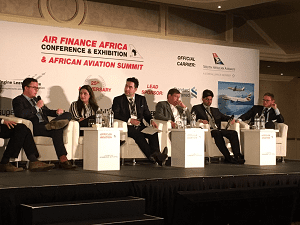Transport World Africa speaks to a panel of international aviation experts to understand the challenges and opportunities facing the African aviation industry today.
For Kieran Glyn, sales and marketing executive, Engine Lease Finance Corporation, long-term planning is crucial. “With the vision that Ethiopian Airlines has set for 2025, it’s clear they plan not just three years ahead. So, you can and should plan long term. It’s a good example to follow the success stories because there are a number of those in Africa,” he said. Tabassum Qadir, chairperson, Skywise Airlines, adds that the industry needs more collaboration and cooperation. “When you enter an airline, you enter the business with emotional intoxication. When you go into this business, you must be well aware that you will make a minimal profit. If you [were to] use the same amount of money in any other business, you’d probably make much more profit. “When you go into this business, you need to understand that it’s not a commercial decision, it’s more of an emotional decision. If you’re ready to burn large amounts of capital, it’s okay to go with emotional intoxication and with passion. But, if you’re jumping in, you have to have the backup capital to support you for the first year,” she warns. “With African airlines, there is skepticism in the market. On entering the market, none of the travel agents will support you because they want to see you at least six months into the operation. In the first six months, you will be flying with 30% or 40% load factors. “If you’re lucky, somebody might hold your hand and then you can continue. But, when you try to go from good to great, it’s ‘not okay’ in this industry. There is a deep-rooted rivalry we should acknowledge and accept. “There are two sets of challenges. In the air, it’s about fuel efficiency, the business plan, the aircraft, etc. And there are other sets of challenges. This is not an industry in which you run your own race. You have to be very aware of that,” she offers. Rules and regulations Michael Adams, business development manager, Solenta Aviation, explains that the biggest challenge facing African airlines is regulatory in nature. “Regulation is, of course, necessary because of the game that we play and because of the people’s lives that we’re responsible for. But regulation needs to enable airlines, not inhibit them.” Steven Graham, director, Avalon Aerospace, says the industry needs to look at not just the challenges, but the positives, too. “When you look at Africa, there are some great success stories – Ethiopian Airlines, clearly, but also Royal Emerald, Mango and Comair. So, there are some great success stories out there and I think airlines around Africa should leverage those success stories. Information needs to be shared in that regard.” Size also doesn’t matter. “You don’t have to be big to be successful. We have placed an aircraft into Nile Air that is delivering this month in Egypt. Nile Air is currently operating with four aircraft but they are profitable and have positive cash flow. Success stories like that need to be replicated across the region. George O’Neill, senior vice-president, Dubai Aerospace, agrees that the biggest challenge facing African aviation right now pertains to its many regulatory issues. “There is a lot of good in Africa; its home to a billion people, it’s a huge continent, it’s increasingly urbanising and there’s massive growth. There’s going to be 50 cities with over a million people in the next four to five years. “But, the issue then becomes fragmentation of the market, as there are over 50 national governments. Compare that to India, which has a similar population but one government and one civil aviation authority. African governments need to get together and address the regulatory/red tape issues,” O’Neill opines. Nick Vlok, GM: Operations, Mango Airlines, adds that airlines must have a viable business plan that makes provision for positioning themselves in the market. “Most failures occur because the viability of the business plan was suspect from the word go. If you don’t get that right, you will never succeed. Airlines need to be cash positive. Unless you are cash positive, you have no resilience; there’s little to no upset that you could withstand. Also, you need to have a safe, compliant and productive operation. Those are the fundamental basics of getting an airline going and keeping it going.” Avi Bhatt, sales representative, Willis Lease Finance Corporation, backs up Vlok’s view, saying, “Once you start the airline, you have to have the business plan. You have to have the finances. It’s not a short-term plan; the capital that you require to start this business is significant. The profitability is almost negative in the first two or three years. “If you have a hiccup, you have to have the necessary cash reserves to support that structure. You don’t have to start with new aircraft. You don’t need to own everything. If you look at how Mango started, they don’t own any of their assets – they lease all of them and they seem to be pretty stable; they seem to be profitable,” states Bhatt.“Comair started with old aircraft and they operate efficiently. They have new aircraft on their balance sheet today but, in the past, it was all old aircraft. They made their profits and they went on. But, you need to have the necessary assets, the right equipment and then you have to meet the regulatory environment and ensure that you are compliant. Not being compliant means safety issues come into play.
“We’ve had one airline grounded recently as a result of non-compliance. Then you’ve got Africa’s inter-governmental or intra-governmental issues where politicians across countries don’t share the same vision. If you do get into the local airline industry as a domestic player, you’ve got to meet a whole lot of other regulatory issues. It’s not a game or organisation where you produce stuff.” Decision time Only 12 of 54 African nations have been willing to execute and proceed with the multinational liberalisation of African skies, promulgated by the Yamoussoukro Decision (YD). The African aviation model is all about seeking local partnerships and using the “mothership”, as some describe it, to provide services to a number of separate operating entities. What is required is the creation of an Africa-wide regulatory authority. Active participation of the 12 countries would be a real positive as they would correctly understand the benefits of such an authority, and decide its responsibilities, operations and worthiness. Such an authority could address a number of key issues not merely related to costs. One can imagine the benefits and perception of global aircraft finance lessors of seeing a well-funded, well-resourced, unified body responsible for oversight in these dozen countries. All the concerns about resilience and value would simply fall away. Networks Africa needs a proper passenger aviation network to feed back into economic growth. Solutions have to come from the various governments and from the airlines. If Africa can get that right, it stands to benefit greatly. It is not that there is no will to implement YD, but rather that there are many things that need to change first in terms of legislation in several African countries – South Africa being one of them. That process to change legislation in order to properly adopt YD is not particularly easy. That’s been the hold-up, certainly in the case of South Africa. Once YD is implemented, the way African airlines do business will fundamentally change and there is no guarantee that some of the current business models used today will survive. Within Africa, we don’t have a central body to control airspace or aircraft maintenance. In fact, forget Africa; just within sub-Saharan African countries, we don’t even have consistency. So once you have that consistency sorted out, you can then start to implement open skies within two or three countries. Once you’ve adopted open skies within those two or three countries, then you might see it opening up. If you were to open it up tomorrow, you’d have a lot of failures. It’s all about momentum; once you have momentum in something, others will follow. If they see it as a successful model, they will follow. Competition, though, in a managed way, will also be good; it will lead to more efficient business models, better service and better welfare for customers. Airline competition would likely drive cost disciplines, like what has happened in Europe, and it would also drive efficiencies and more agile businesses.






